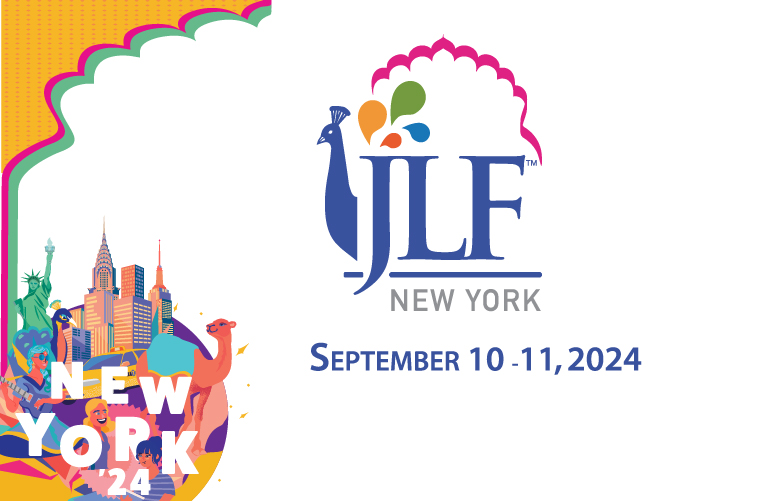

Program
Music
Utsav Lal & Alec GoldfarbInaugural Address: Each Other's Stories
Namita Gokhale, Sanjoy K. Roy, William Dalrymple, Sandeep Chakravorty, Consul General of India in New York, and Tom Nagorski, Executive Vice President of Asia Society01. Food, Memory and Culture:
Chandrahas Choudhury, Krishnendu Ray and Adam Platt in conversation with Ligaya MishanOur taste buds carry receptors of memory and food is an intangible trigger of feelings and emotions, internal states of the mind and body. The complex relationship between food, memory, and narrative has been invoked by writers in literature across the world. To most of us, the food that we associate with home is an essential part of our identity and cultural heritage. Novelist Chandrahas Choudhury, academic and scholar of food studies Krishnendu Ray alongside iconic food critics Adam Platt and Ligaya Mishan discuss the intersections of food, memory, and culture.
02. These Lands We Call Home:
Neeraj Kaushal, Zarrar Said, Alia Malek, and Prajwal Parajuly in conversation with Ruchira GuptaThe South Asia Institute at Columbia University
In an age of immigrants and global movement, more and more people claim a multiplicity of coexisting identities. They seek better opportunities, flee from the horrors of war and politics, or seek refuge from natural calamities. The pain and suffering of dislocated communities is matched by rising decibels of nativist fervor. A panel of writers and thinkers looks at the forces of nationalism, the demographics and economics of human movement, as well as the personal interpretations and stories of the lands we call home.
03. Caste, Color, and Gender:
Margo Jefferson, Yashica Dutt, and Sharmila Sen in conversation with Prajwal ParajulyMotwani Jadeja Foundation
Variables of race and color, class and gender confront and mock the very idea of social justice. Pulitzer Prize-winning writer and critic Margo Jefferson is the author of Negroland, a landmark work on privilege, discrimination, and the fallacy of post-racial America. Sharmila Sen’s Not Quite Not White is a first-generation immigrant’s exploration of race and assimilation in the United States. Yashica Dutt’s memoir Coming Out as Dalit pushes us to confront the injustices of the Indian caste system. In conversation with author Prajwal Parajuly, they share their experiences and convictions.
04. Mapping the Heavens:
Priyamvada Natarajan introduced by Sree SreenivasanTampa Bay Literary Society
Priyamvada Natarajan is noted for her work in mapping dark matter, dark energy and black holes, and has authored Mapping the Heavens: The Radical Scientific Ideas That Reveal the Cosmos. She argues in her book that maps encode the current state of knowledge while also delineating what remains unknown. Her extraordinary gift for making abstract and complex scientific ideas accessible to general audiences and her commitment to developing strategies to enhance numerical and scientific literacy for the public at large make her a powerful ambassador for science. She speaks of the missing pieces of the puzzles in our understanding of black holes, and how some of her early theories have recently been vindicated. A fascinating and engrossing session introduced by Sree Srinavasan, Marshall Loeb Professor of Digital Innovation at Stony Brook University.
05. The Healing:
Manisha Koirala in conversation with Sanjoy K. RoyTampa Bay Literary Society
Bollywood actor Manisha Koirala shares the highs and lows of her life, her career, relationships, and her battle with ovarian cancer. In conversation with Sanjoy K. Roy, Managing Director of Teamwork Arts, she speaks of the pressures of her film career, the life choices she was compelled to make, and how she redefined her priorities and regained a sense of balance and well-being. A no-holds-barred session about the emotional roller-coaster ride of Koirala’s life post-diagnosis, her learnings and inspirations, and the process of healing.
06. The Anarchy:
William Dalrymple introduced by Sanjoy K. RoyMotwani Jadeja Foundation
In August 1765, the East India Company defeated the young Mughal emperor and forced him to set up in his richest provinces a new administration run by English merchants who collected taxes through means of a ruthless private army, what we would now call an act of involuntary privatization.
The East India Company’s founding charter authorized it to “wage war” and it had always used violence to gain its ends. But the creation of this new government marked the moment that the East India Company ceased to be a conventional international trading corporation dealing in silks and spices, and became something much more unusual: an aggressive colonial power in the guise of a multinational business. In less than 500 years, it had trained up a security force of around 200,000 men and had subdued an entire subcontinent, conquering first Bengal and finally, in 1803, the Mughal capital of Delhi itself. The Company’s reach stretched until almost all of India and was effectively ruled from a boardroom in London.
The Anarchy charts how one of the world’s most magnificent empires disintegrated and how it came to be replaced by a dangerously unregulated private company. In his most ambitious and riveting book to date, William Dalrymple tells the story of the East India Company as it has never been told before.